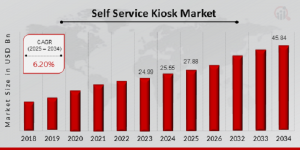Self-Service Kiosk Market Expected to Hit USD 45.84 Billion by 2034, with a CAGR of 6.20%
Self-Service Kiosk Market: Rising demand for automation in retail and hospitality is driving steady growth in the self-service kiosk market.
The global self-service kiosk market has been experiencing significant growth over recent years, driven by increasing consumer demand for convenience, efficiency, and faster services across various sectors. Self-service kiosks are interactive terminals that allow users to access information or services without the need for direct interaction with a human operator. These kiosks are commonly used in retail, banking, healthcare, hospitality, and transportation industries, among others.
Download Sample Report (Get Full Insights in PDF - 128 Pages) at:
https://www.marketresearchfuture.com/sample_request/29585
As businesses seek to enhance customer experience while reducing operational costs, the adoption of self-service kiosks has become a strategic priority. The growing emphasis on digital transformation, coupled with technological advancements such as AI, IoT, and touchscreen interfaces, has further contributed to the market’s expansion. Moreover, the COVID-19 pandemic accelerated the need for contactless solutions, prompting industries to implement kiosks as part of their hygiene and safety protocols. The integration of payment systems, user-friendly software, and remote monitoring capabilities has made these kiosks indispensable in the modern service ecosystem.
Key Companies in the Self Service Kiosk Market Include
• Evoke Kiosks
• Capital Kiosks
• Azonic Automation
• Bytespeed Technologies
• Advantech
• Unattended Technology
• HP
• IBM
• Posiflex
• TouchPoint Solutions
• KioSoft
• Diebold Nixdorf
• NCR
• Fujitsu
• Control Technology
Diebold Nixdorf has been a prominent name in the banking and financial sector, offering self-service solutions tailored to ATM networks and digital banking. Kiosk Information Systems is known for its robust, customizable kiosks designed for industries ranging from healthcare to hospitality. Meanwhile, Glory Global Solutions focuses on cash management kiosks, particularly within retail and banking environments. Zebra Technologies is also making significant strides with its printing and barcode scanning kiosks. These companies are investing heavily in R&D to introduce next-generation kiosks equipped with facial recognition, biometric authentication, and advanced data analytics, ensuring their continued relevance and competitive edge in a rapidly evolving market.
The market for self-service kiosks growth is broadly segmented based on component, type, end-use industry, and geography. By component, the market includes hardware, software, and services. Hardware components such as displays, printers, and card readers constitute the core of kiosk functionality. Software enables user interaction, system management, and integration with enterprise backends. Services include installation, maintenance, and support, all critical for kiosk longevity and performance. Based on type, kiosks can be categorized into information kiosks, ticketing kiosks, self-checkout kiosks, financial kiosks, and others.
Each type addresses specific user needs—information kiosks provide wayfinding and informational content; ticketing kiosks enable bookings and reservations; self-checkout kiosks are widely used in retail for streamlining purchases; and financial kiosks facilitate banking transactions. In terms of end-use industry, the primary segments include retail, banking & financial services, travel & tourism, healthcare, hospitality, and government. Among these, retail has emerged as the largest segment, as businesses aim to reduce queues and improve shopping experiences. However, healthcare and government sectors are catching up rapidly due to rising demand for contactless, efficient service delivery.
Buy Now Premium Research Report -
https://www.marketresearchfuture.com/checkout?currency=one_user-USD&report_id=29585
The dynamics of the self-service kiosk market are influenced by several factors including increasing consumer expectations, rising labor costs, and continuous technological innovation. One of the key driving forces is the shift in consumer behavior towards self-reliance and digital interaction. Customers today expect instant access to services and information, and kiosks provide a perfect solution by offering 24/7 availability and intuitive interfaces. Rising labor costs across developed and emerging economies have also pushed businesses to automate routine tasks using kiosks, thus improving efficiency and reducing dependency on human staff.
On the technological front, developments in touch screen interfaces, machine learning, voice recognition, and secure payment technologies have significantly enhanced kiosk functionality and reliability. However, the market faces certain challenges, including high initial deployment costs and concerns around cybersecurity. Additionally, maintenance and integration with legacy systems can pose hurdles for widespread adoption. Nonetheless, opportunities abound in emerging markets, where digital infrastructure is rapidly evolving and urbanization trends are driving demand for automated public services.
Recent developments in the self-service kiosk market outlook have focused on innovation and strategic partnerships aimed at enhancing user experience and expanding market presence. Companies have been launching new products with cutting-edge features such as AI-powered customer assistance, multilingual interfaces, and real-time data analytics. For instance, NCR Corporation recently introduced a modular self-checkout system that allows retailers to scale and customize as needed. In another notable development, Diebold Nixdorf partnered with fintech companies to offer advanced financial kiosks that integrate with mobile banking platforms. Meanwhile, healthcare has emerged as a focal point for innovation, with kiosks being deployed for patient check-ins, health screenings, and telemedicine consultations. In the hospitality sector, self-service kiosks are being used for check-ins, food ordering, and concierge services, helping hotels and restaurants streamline operations. Governments, too, are investing in self-service kiosks for public utilities, including bill payments, citizen ID management, and transportation ticketing. These innovations are not only improving service delivery but also enabling organizations to gather valuable user data for insights and decision-making.
Browse In-depth Market Research Report -
https://www.marketresearchfuture.com/reports/self-service-kiosk-market-29585
From a regional perspective, North America currently leads the self-service kiosk market, thanks to the early adoption of advanced technologies and strong presence of market leaders. The United States, in particular, has witnessed extensive deployment of kiosks across retail chains, airports, healthcare institutions, and banks. Europe follows closely, driven by high urbanization rates, supportive regulations for digital transformation, and widespread use of kiosks in the transportation and public service sectors.
The Asia-Pacific region is emerging as the fastest-growing market, fueled by rapid industrialization, increasing consumer demand for digital services, and growing investments in smart city projects. Countries like China, Japan, South Korea, and India are spearheading this growth by deploying kiosks in metro stations, government offices, and retail stores. Latin America and the Middle East & Africa are also witnessing gradual growth, supported by improving digital infrastructure and growing awareness among businesses about the benefits of self-service kiosks. Overall, the global self-service kiosk market is poised for sustained growth, with technological innovation, customer-centric strategies, and expanding applications driving its evolution across all regions.
Explore MRFR’s Related Ongoing Coverage In ICT Domain:
Public Cloud Migration Market -
https://www.marketresearchfuture.com/reports/public-cloud-migration-market-41215
Robotic Bartender Market -
https://www.marketresearchfuture.com/reports/robotic-bartender-market-41221
Social Networking Sites Market -
https://www.marketresearchfuture.com/reports/social-networking-sites-market-41225
Cloud Based Email Security Software Market -
https://www.marketresearchfuture.com/reports/cloud-based-email-security-software-market-41801
Cloud Security Software Market -
https://www.marketresearchfuture.com/reports/cloud-security-software-market-41800
Commercial Blinds And Shade Market -
https://www.marketresearchfuture.com/reports/commercial-blinds-shade-market-41804
Contract Management Software Market -
https://www.marketresearchfuture.com/reports/contract-management-software-market-42111
About Market Research Future:
At Market Research Future (MRFR), we enable our customers to unravel the complexity of various industries through our Cooked Research Report (CRR), Half-Cooked Research Reports (HCRR), Raw Research Reports (3R), Continuous-Feed Research (CFR), and Market Research & Consulting Services.
MRFR team have supreme objective to provide the optimum quality market research and intelligence services to our clients. Our market research studies by products, services, technologies, applications, end users, and market players for global, regional, and country level market segments, enable our clients to see more, know more, and do more, which help to answer all their most important questions.
Contact:
Market Research Future
(Part of Wantstats Research and Media Private Limited)
99 Hudson Street, 5Th Floor
New York, NY 10013
United States of America
+1 628 258 0071 (US)
+44 2035 002 764 (UK)
Email: sales@marketresearchfuture.com
Website: https://www.marketresearchfuture.com
Website: https://www.wiseguyreports.com/
Website: https://www.wantstats.com/
Sagar Kadam
Market Research Future
+1 628-258-0071
email us here
Visit us on social media:
Facebook
X
LinkedIn
Legal Disclaimer:
EIN Presswire provides this news content "as is" without warranty of any kind. We do not accept any responsibility or liability for the accuracy, content, images, videos, licenses, completeness, legality, or reliability of the information contained in this article. If you have any complaints or copyright issues related to this article, kindly contact the author above.
Global Advanced Process Control (APC) Market Insight, Growth, Industry Trends | Reports and Data
Gas Engine Market to Grow at 3.8% CAGR, Reaching $6.0 Bn by 2031
New Music Alert Gospel Rock Artist Rikki Doolan Releases Anthemic Single You Got Somebody
Więcej ważnych informacji
 Jedynka Newserii
Jedynka Newserii

 Jedynka Newserii
Jedynka Newserii

Konsument

Polacy nie korzystają z hossy trwającej na warszawskiej giełdzie. Na wzrostach zarabiają głównie inwestorzy zagraniczni
Od października 2022 roku na rynkach akcji trwa hossa, nie omija ona także warszawskiej giełdy. Mimo to inwestorzy indywidualni odpowiadają zaledwie za kilkanaście procent inwestycji, a o wzrostach decyduje i na nich zarabia głównie kapitał z zagranicy. Widać to również po napływach i odpływach do i z funduszy inwestycyjnych. Zdaniem Tomasza Koraba, prezesa EQUES Investment TFI, do przekonania Polaków do inwestowania na rodzimej giełdzie potrzeba zysków z akcji, informacji o tych zyskach docierającej do konsumentów oraz czasu.
Polityka
Obowiązek zapełniania magazynów gazu w UE przed sezonem zimowym ma zapewnić bezpieczeństwo dostaw. Wpłynie też na stabilizację cen

Unia Europejska przedłuży przepisy z 2022 roku dotyczące magazynowania gazu. Będą one obowiązywać do końca 2027 roku. Zobowiązują one państwa członkowskie do osiągnięcia określonego poziomu zapełnienia magazynów gazu przed sezonem zimowym. Magazyny gazu pokrywają 30 proc. zapotrzebowania Unii Europejskiej na niego w miesiącach zimowych. Nowe unijne przepisy mają zapewnić stabilne i przystępne cenowo dostawy.
Infrastruktura
Gminy zwlekają z uchwaleniem planów ogólnych zagospodarowania przestrzennego. Może to spowodować przesunięcie terminu ich wejścia w życie

Reforma systemu planowania i zagospodarowania przestrzennego rozpoczęła się we wrześniu 2023 roku wraz z wejściem w życie większości przepisów nowelizacji ustawy z 27 marca 2003 roku. Uwzględniono w niej plany ogólne gminy (POG) – nowe dokumenty planistyczne, za których przygotowanie mają odpowiadać samorządy. Rada Ministrów w kwietniu br. uchwaliła jednak ustawę o zmianie ustawy z 7 lipca 2023 roku, a jej celem jest zmiana terminu obowiązywania studiów uwarunkowań i kierunków zagospodarowania przestrzennego gmin na 30 czerwca 2026 roku. Wskazana data może nie być ostateczna z uwagi na to, że żadna z gmin nie uchwaliła jeszcze POG.
Partner serwisu
Szkolenia

Akademia Newserii
Akademia Newserii to projekt, w ramach którego najlepsi polscy dziennikarze biznesowi, giełdowi oraz lifestylowi, a także szkoleniowcy z wieloletnim doświadczeniem dzielą się swoją wiedzą nt. pracy z mediami.









.gif)

 |
| |
| |
|